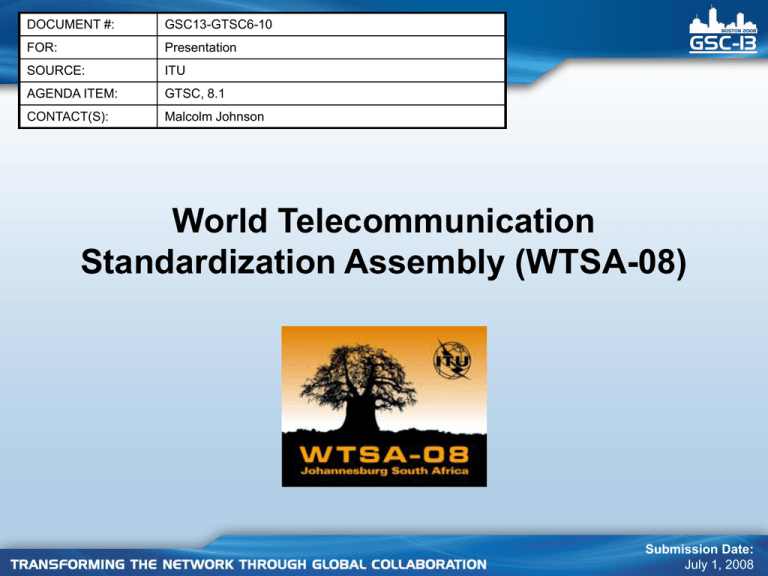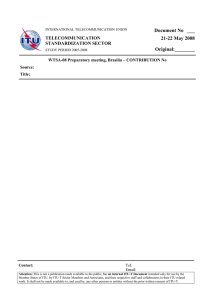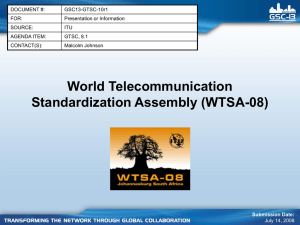World Telecommunication Standardization Assembly (WTSA-08) DOCUMENT #: GSC13-GTSC6-10
advertisement

DOCUMENT #: GSC13-GTSC6-10 FOR: Presentation SOURCE: ITU AGENDA ITEM: GTSC, 8.1 CONTACT(S): Malcolm Johnson World Telecommunication Standardization Assembly (WTSA-08) Submission Date: July 1, 2008 WTSA-08 21-30 October, Johannesburg • WTSA sets direction and structure for ITU-T • Meets every four years • Regional preparation meetings important part of the process • Defines the general policy for the Sector • Establishes the Study Groups • Approves their expected work programme • Appoints their chairmen and vice-chairmen • WTSA Resolutions are available at: itu.int/ITU-T/wtsa/resolutions 2 Global Standards Symposium • To be held day before WTSA, 20 October 2008, Johannesburg • itu.int/ITU-T/wtsa-08/gss/ • Will bring together all standards making bodies • Themes: • Reducing the standardization gap • Improving collaboration • ICTs and Climate change • Accessibility and disability 3 GSS/WTSA Exhibition • Opportunity to exhibit at a three day special event during GSS and WTSA-08 • ITU and the Department of Communication of South Africa are organizing an exhibition that will feature mainly information and communication technology providers • itu.int/ITU-T/wtsa-08/info/exhibition 4 Restructuring the Study Groups Objectives • Decide on future standardization topics (Questions) • Create structure to efficiently address future work • Ensure relevant, clear mandates avoiding duplication • Facilitate participation, especially of developing countries • Improve visibility to outside world Status • Many different views and objectives • First application of chairmanship term limits • TSAG review at July meeting • Candidates for chairmanship received 5 Expected results: Restructuring • Reduced number of Study Groups • Increased efficiency • Less need to travel • Save money for ITU and participants • Less liaisons and duplication • More co-located meetings • More focus on developing country requirements • Establishment of more regional groups • More use of remote participation • More meetings in the regions 6 Revision/adoption of Resolutions Objective • Ensure that the guiding principles and working methods of ITU-T are up to date and are improved as necessary to take into account the current ICT environment Status • Some proposals have been discussed • TSB will provide review of actions related to 2004 Resolutions Expected results • New Resolutions on climate change; accessibility? 7 Improved working methods Objectives • Review current electronic working methods • Procedures for remote participation • Review status of JCA, GSI, Focus Groups • Improved efficiency Status • Current AAP procedures generally considered successful • WTSA 32 Strengthening the use of electronic working methods for the work of ITU-T instructs the Director of TSB to: maintain the EDH Action Plan… Expected results • Definition GSI, JCA… • Emphasis on remote collaboration tools • Revision of A-series Recommendations 8 Election of new SG and TSAG chairs • Candidatures received • List with CVs of each candidate will be circulated • Heads of delegation prepare in consultation with Director a consolidated list of designated study group chairmen and vice-chairmen • WTSA Plenary decides 9 Election considerations: • • • • • • • Equitable geographical distribution Representation of developing countries Proven competence in the Study Group concerned Management skills Continuity of participation in the Study Group Not an “honorary” position ITU will not provide financing • Commitment of time/resource by the admin and/or company • Minimum number of candidates per country • Non appointment to chairmanship should not automatically entitle a vice-chairmanship • Preference should be given to candidates from members having the lowest number of chairmen 10 ITU-T future work programme • • • • • • • • • • • Bridging the standardization gap ICTs and climate change Accessibility and disability Next Generation Network (NGN) IPTV Home networking Cybersecurity including Identity management Mobility Ubiquitous networks Telecoms and cars Network infrastructure: optical transport, network management, signalling, performance and QoS, electromagnetic compatibility (EMC), architecture, interoperability, etc. 11 In Summary main topics • • • • Study Group structure Work programme Bridging the Standardization Gap ICTs and Climate change • Identification of emerging technologies for standardization • ITU-T Technology Watch function • Increase academic participation • Increase research institute participation • Cybersecurity • Relationship with SDOs and forums 12 Possible new initiatives • Recommendation to Council/PP-10 for new category of membership for academia • Reduced Sector Membership fee for SMEs, at least SMEs from developing countries • Action to address proliferation of standards bodies • Proposals to improve collaboration with and participation of research institutes • New work on climate change • New work on testing and certification 13


